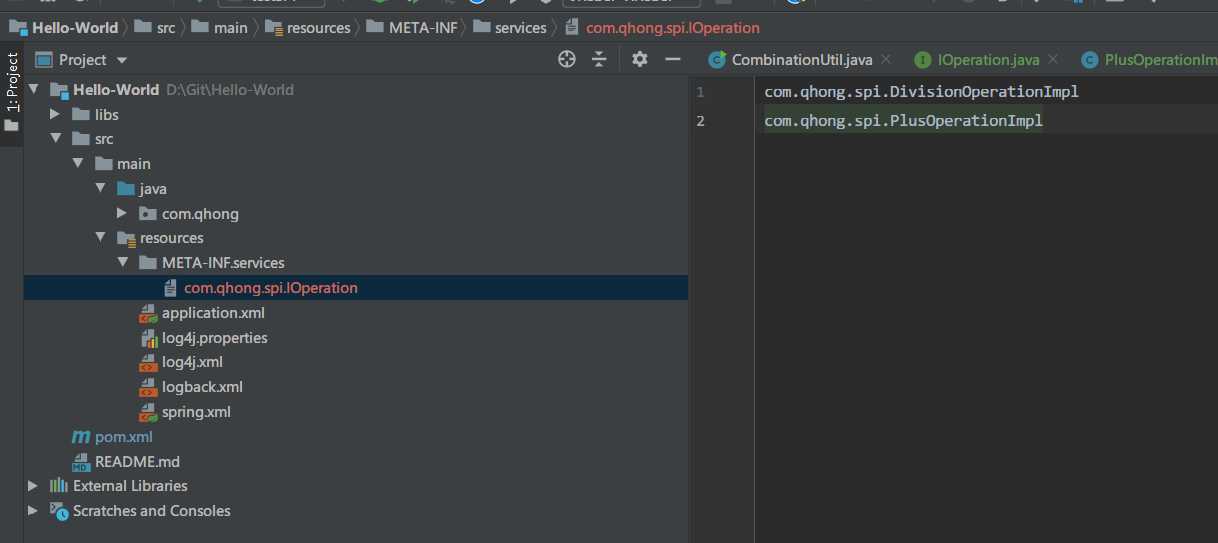SPI的全名为Service Provider Interface,主要是应用于厂商自定义组件或插件中。在java.util.ServiceLoader的文档里有比较详细的介绍。简单的总结下java SPI机制的思想:我们系统里抽象的各个模块,往往有很多不同的实现方案,比如日志模块、xml解析模块、jdbc模块等方案。面向的对象的设计里,我们一般推荐模块之间基于接口编程,模块之间不对实现类进行硬编码。一旦代码里涉及具体的实现类,就违反了可拔插的原则,如果需要替换一种实现,就需要修改代码。为了实现在模块装配的时候能不在程序里动态指明,这就需要一种服务发现机制。 Java SPI就是提供这样的一个机制:为某个接口寻找服务实现的机制。有点类似IOC的思想,就是将装配的控制权移到程序之外,在模块化设计中这个机制尤其重要。
SPI具体约定
Java SPI的具体约定为:当服务的提供者提供了服务接口的一种实现之后,在jar包的META-INF/services/目录里同时创建一个以服务接口命名的文件。该文件里就是实现该服务接口的具体实现类。而当外部程序装配这个模块的时候,就能通过该jar包META-INF/services/里的配置文件找到具体的实现类名,并装载实例化,完成模块的注入。基于这样一个约定就能很好的找到服务接口的实现类,而不需要再代码里制定。jdk提供服务实现查找的一个工具类:java.util.ServiceLoader。
首先我们提供一个接口类 IOperation 以及它的两个实现类 PlusOperationImpl 和 DivisionOperationImpl,都在 com.qhong.spi 这个包路径下。
package com.qhong.spi;
/**
* @author qhong
* @date 2020/3/22 0:16
**/
public interface IOperation {
int operation(int numberA, int numberB);
}
package com.qhong.spi;
/**
* @author qhong
* @date 2020/3/22 0:17
**/
public class PlusOperationImpl implements IOperation {
public PlusOperationImpl() {
System.out.println("plusOperation construct");
}
public int operation(int numberA, int numberB) {
System.out.println("Operation: plus");
return numberA + numberB;
}
}package com.qhong.spi;
/**
* @author qhong
* @date 2020/3/22 0:17
**/
public class DivisionOperationImpl implements IOperation {
public DivisionOperationImpl() {
System.out.println("division construct");
}
@Override
public int operation(int numberA, int numberB) {
System.out.println("Operation: division");
return numberA / numberB;
}
}在resources文件夹下新建META-INF文件夹,并创建/services/com.qhong.spi.IOperation文件

public class testSPI {
public static void main(String[] args) {
ServiceLoader<IOperation> operations = ServiceLoader.load(IOperation.class);
int numberA = 6;
int numberB = 3;
System.out.println("NumberA: " + numberA + ", NumberB: " + numberB);
Iterator<IOperation> iterator = operations.iterator();
while (iterator.hasNext()) {
IOperation operation = iterator.next();
System.out.println(operation.operation(numberA, numberB));
}
}
}
Output:
NumberA: 6, NumberB: 3
division construct
Operation: division
2
plusOperation construct
Operation: plus
9应用程序调用 ServiceLoader.load 方法
ServiceLoader.load 方法内先创建一个新的ServiceLoader,并实例化该类中的成员变数,包括:
应用程序通过迭代器获取对象实例
ServiceLoader 先判断成员变量 providers 对象中否有缓存实例对象,如果有缓存,直接返回。
如果没有缓存,执行类的装载:读取 META-INF/services/ 下的配置文件,获得所有能被实例化的类的名称,通过反射方法 Class.forName() 载入类对象,并用 instance() 方法将类实例化。把实例化后的类缓存到providers 对象中然后返回实例对象。
java.sql.DriverManager private static void loadInitialDrivers() {
String drivers;
try {
drivers = AccessController.doPrivileged(new PrivilegedAction<String>() {
public String run() {
return System.getProperty("jdbc.drivers");
}
});
} catch (Exception ex) {
drivers = null;
}
// If the driver is packaged as a Service Provider, load it.
// Get all the drivers through the classloader
// exposed as a java.sql.Driver.class service.
// ServiceLoader.load() replaces the sun.misc.Providers()
AccessController.doPrivileged(new PrivilegedAction<Void>() {
public Void run() {
ServiceLoader<Driver> loadedDrivers = ServiceLoader.load(Driver.class);
Iterator<Driver> driversIterator = loadedDrivers.iterator();
try{
while(driversIterator.hasNext()) {
driversIterator.next();
}
} catch(Throwable t) {
// Do nothing
}
return null;
}
});
println("DriverManager.initialize: jdbc.drivers = " + drivers);
if (drivers == null || drivers.equals("")) {
return;
}
String[] driversList = drivers.split(":");
println("number of Drivers:" + driversList.length);
for (String aDriver : driversList) {
try {
println("DriverManager.Initialize: loading " + aDriver);
Class.forName(aDriver, true,
ClassLoader.getSystemClassLoader());
} catch (Exception ex) {
println("DriverManager.Initialize: load failed: " + ex);
}
}
}ServiceLoader<Driver> loadedDrivers = ServiceLoader.load(Driver.class);
java.util.ServiceLoader public static <S> ServiceLoader<S> load(Class<S> service) {
ClassLoader cl = Thread.currentThread().getContextClassLoader();
return ServiceLoader.load(service, cl);
}引用
public static <S> ServiceLoader<S> load(Class<S> service,
ClassLoader loader)
{
return new ServiceLoader<>(service, loader);
}引用
private ServiceLoader(Class<S> svc, ClassLoader cl) {
service = Objects.requireNonNull(svc, "Service interface cannot be null");
loader = (cl == null) ? ClassLoader.getSystemClassLoader() : cl;
acc = (System.getSecurityManager() != null) ? AccessController.getContext() : null;
reload();
}引用
public void reload() {
providers.clear();
lookupIterator = new LazyIterator(service, loader);
}引用
private class LazyIterator
implements Iterator<S>
{
Class<S> service;
ClassLoader loader;
Enumeration<URL> configs = null;
Iterator<String> pending = null;
String nextName = null;
private LazyIterator(Class<S> service, ClassLoader loader) {
this.service = service;
this.loader = loader;
}
private boolean hasNextService() {
if (nextName != null) {
return true;
}
if (configs == null) {
try {
String fullName = PREFIX + service.getName();
if (loader == null)
configs = ClassLoader.getSystemResources(fullName);
else
configs = loader.getResources(fullName);
} catch (IOException x) {
fail(service, "Error locating configuration files", x);
}
}
while ((pending == null) || !pending.hasNext()) {
if (!configs.hasMoreElements()) {
return false;
}
pending = parse(service, configs.nextElement());
}
nextName = pending.next();
return true;
}
private S nextService() {
if (!hasNextService())
throw new NoSuchElementException();
String cn = nextName;
nextName = null;
Class<?> c = null;
try {
c = Class.forName(cn, false, loader);
} catch (ClassNotFoundException x) {
fail(service,
"Provider " + cn + " not found");
}
if (!service.isAssignableFrom(c)) {
fail(service,
"Provider " + cn + " not a subtype");
}
try {
S p = service.cast(c.newInstance());
providers.put(cn, p);
return p;
} catch (Throwable x) {
fail(service,
"Provider " + cn + " could not be instantiated",
x);
}
throw new Error(); // This cannot happen
}
public boolean hasNext() {
if (acc == null) {
return hasNextService();
} else {
PrivilegedAction<Boolean> action = new PrivilegedAction<Boolean>() {
public Boolean run() { return hasNextService(); }
};
return AccessController.doPrivileged(action, acc);
}
}
public S next() {
if (acc == null) {
return nextService();
} else {
PrivilegedAction<S> action = new PrivilegedAction<S>() {
public S run() { return nextService(); }
};
return AccessController.doPrivileged(action, acc);
}
}
public void remove() {
throw new UnsupportedOperationException();
}
}注意driversIterator.next()最终就是调用Class.forName(DriverName, false, loader)方法
因为这句Class.forName(DriverName, false, loader)代码所在的类在java.util.ServiceLoader类中,而ServiceLoader.class又加载在BootrapLoader中,因此传给 forName 的 loader 必然不能是BootrapLoader,这时候只能使用TCCL了,也就是说把自己加载不了的类加载到TCCL中(通过Thread.currentThread()获取,简直作弊啊!)。上面那篇文章末尾也讲到了TCCL默认使用当前执行的是代码所在应用的系统类加载器AppClassLoader。
再看下看ServiceLoader.load(Class)的代码
public static <S> ServiceLoader<S> load(Class<S> service) {
ClassLoader cl = Thread.currentThread().getContextClassLoader();
return ServiceLoader.load(service, cl);
}ContextClassLoader默认存放了AppClassLoader的引用,由于它是在运行时被放在了线程中,所以不管当前程序处于何处(BootstrapClassLoader或是ExtClassLoader等),在任何需要的时候都可以用Thread.currentThread().getContextClassLoader()取出应用程序类加载器来完成需要的操作。
到这儿差不多把SPI机制解释清楚了。直白一点说就是,我(JDK)提供了一种帮你(第三方实现者)加载服务(如数据库驱动、日志库)的便捷方式,只要你遵循约定(把类名写在/META-INF里),那当我启动时我会去扫描所有jar包里符合约定的类名,再调用forName加载,但我的ClassLoader是没法加载的,那就把它加载到当前执行线程的TCCL里,后续你想怎么操作(驱动实现类的static代码块)就是你的事了。
JDK 内置的 SPI 机制本身有它的优点,但由于实现比较简单,也有不少缺点。
使用 Java SPI 机制的优势是实现解耦,使得接口的定义与具体业务实现分离,而不是耦合在一起。应用程序可以根据实际业务情况启用或替换具体组件。
鉴于 SPI 的诸多缺点,很多系统都是自己实现了一套类加载机制,例如 dubbo。用户也可以自定义classloader+反射机制来加载,实现并不复杂。此外开源的类加载解决方案有 Plugin Framework for Java (PF4J) 等。
原文:https://www.cnblogs.com/hongdada/p/12543654.html